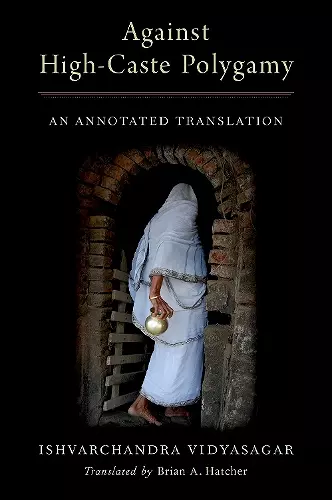Against High-Caste Polygamy
An Annotated Translation
Ishvarchandra Vidyasagar author Brian A Hatcher translator
Format:Hardback
Publisher:Oxford University Press Inc
Published:11th Sep '23
Should be back in stock very soon

Against High-Caste Polygamy offers a complete, annotated translation of Ishvarchandra Vidyasagar's 1871 tract arguing against the practice of high-caste Kulin marriage in Bengal. Vidyasagar published this work fifteen years after passage of the Hindu Widow's Remarriage Act, which owed so much to his earlier reform leadership. However, in the wake of the Rebellion of 1857 British and Indian attitudes toward official intervention in customary practices underwent a sea change.The British were increasingly reluctant to create unrest, while many Indian leaders began to question the legitimacy of seeking government assistance for social change. The age of active collaboration between the British officials and Indian reformers had passed. In Against High-Caste Polygamy, Vidyasagar demonstrates both his continued faith in an earlier approach to reform and his frustration at the new tenor of the times. Against High-Caste Polygamy is not a treatise on polygamy in general. Rather, it addresses a subset of polygamous marriage as practiced among the highest Hindu castes in eastern India, or what then constituted the Bengal Presidency of British India. This particular form of polygamy came to be known in English as Kulinism, from the term for a person who holds high clan rank (known in Bengali as a kulina). As Vidyasagar shows, Kulinism rests on a highly articulated and historically entrenched system of status and rank that trapped women in wretched domestic situations. Against High-Caste Polygamy is Vidysagar's attempt to open the eyes of Bengali readers as well as the government to the extent and dire ramifications of polygamous practices that often left women ostracized, neglected, and abused. This translation makes Vidyasagar's polemic available to English-language readers for the first time. It features a scholarly introduction, extensive notes, and a variety of supplementary critical tools.
Against High-Caste Polygamy departs from this pattern, by engaging a range of other rhetorical, interpretive, and explanatory methods. One does find the necessary overview of Hindu legal texts, but readers will discover much more. * Brian A. Hatcher, Packard Professor of Theology in the Department of Religion at Tufts University. *
This magnificent book demonstrates how precolonial Indian forms of textual exegesis and debate foundationally shaped the birth of the modern Indian public sphere. By unearthing the nexus between patriarchy and accumulation of capital, it provides us new intellectual resources to critique 'marital capitalism.' A tour de force-must-read for anyone interested in Indian intellectual and gender history. * Milinda Banerjee, Author of The Mortal God: Imagining the Sovereign in Colonial India *
Only Brian Hatcher could have so elegantly translated a text like Against High-Caste Polygamy. Hatcher's fascinating introduction highlights Vidyasagar's contribution toward an imaginative sociology of Bengal, embellished by an early data-driven perspective, and informed by enormous sympathy for Bengali women trapped in Kulin marriages. Hatchers voice merges with this sympathy, while retaining its analytical acumen. This book is central for understanding women's reform in colonial India and is a tremendous read. * Deepra Dandekar, PhD, Researcher, Leibniz-Zentrum Moderner Orient, Berlin *
A daunting task indeed-to make relevant a late-nineteenth century text on the plight of high-caste Hindu women, subject to, as Vidyasagar writes 'the practice of this hideous and cruel custom' of serial polygamy. Hatcher's seamless introduction and extremely readable translation successfully highlights Vidyasagar's fundamental ethical commitment to women's dignity. He neatly contextualizes the author's Brahmanical heritage that could have predicated an inherently patriarchal viewpoint. * Malavika Karlekar, Editor of Indian Journal of Gender Studies *
The significance of Hatcher's work, an indispensable Vidyasagar scholar of our time, lies in the attempt to make the social reformer's works available to the English-speaking world. * Mahitosh Mandal, Indian Forum *
Against High-Caste Polygamy is an important addition to the literature on 19th-century Hindu reformism. * Thomas Newbold, Reading Religion *
The appendices and the bibliography are highly valuable and taken together this book marks a new height in Hatcher'sscholarly research on Vidyasagar and nineteenth-century Bengal. * Anindya Sekhar Purakayastha, South Asia Research *
ISBN: 9780197675908
Dimensions: 162mm x 237mm x 18mm
Weight: 413g
192 pages